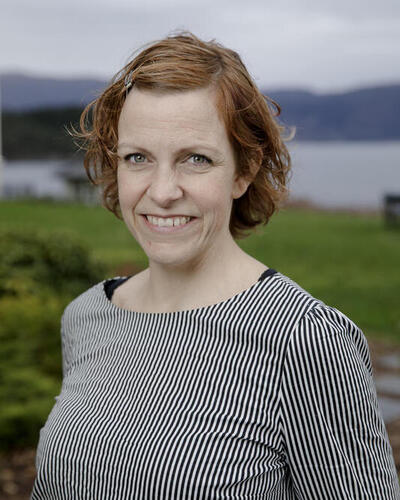- E-mailFroydis.Morken@uib.no
- Phone+47 55 58 62 87
- Visitor AddressJonas Lies vei 915009 BergenRoom9B102P
- Postal AddressPostboks 78075020 Bergen
- Dyslexia
- Reading
- Writing
- Cognitive skills
- Brain function in children with dyslexia
- fMRI
- Second language learning
- Foreign language learning
Academic article
- (2024). Investigating pragmatic abilities in 5- to 7-year-old Norwegian children: A study using the Pragma test. First language.
- (2023). Oral language skills and mental health in female prisoners: pragmatic skills are essential. Frontiers in Psychology.
- (2023). Disentangling dyslexia from typical L2-learning in emergent literacy. Dyslexia.
- (2022). Oral language problems in Norwegian female prisoners. Journal of Correctional Education. 31-48.
- (2022). Ikke-kanonisk leddstilling i norske barns språk. Norsk tidsskrift for logopedi. 8-20.
- (2021). Kindergarten screening tools filled out by parents and teachers targeting dyslexia. Predictions and developmental trajectories from age 5 to age 15 years. Dyslexia.
- (2018). Lese- og skriveprosessering og dysleksi. Psyke & Logos. 97-113.
- (2018). Auditive training effects from a dichotic listening app in children with dyslexia. Dyslexia. 336-356.
- (2016). Reading in dyslexia across literacy development: A longitudinal study of effective connectivity. NeuroImage. 92-100.
- (2016). Neurocognitive development and predictors of L1 and L2 literacy skills in dyslexia: A longitudinal study of children 5-11 years old. Dyslexia. 3-26.
- (2015). The dynamics of narrative writing in primary grade children: Writing process factors predict story quality. Reading and writing. 529-554.
- (2014). Children with dyslexia show cortical hyperactivation in response to increasing literacy processing demands. Frontiers in Psychology.
- (2013). Writing in dyslexia: product and process. Dyslexia. 131-148.
Lecture
- (2022). Språkforstyrrelser og dysleksi. .
Academic lecture
- (2023). Early Screening for Dyslexia: The Value of Teacher and Parental Report.
- (2022). Language and literacy in the prison population. .
- (2021). Dyslexi hos barn med norska som andrespråk.
- (2019). An exploration of DLD/SLI in Norwegian.
- (2015). The Bergen Longitudinal Dyslexia Study in a nutshell.
- (2015). Early detection of children at risk of school failure caused by language impairment.
- (2012). The Bergen Tell-a-tale Project. A neurolinguistic perspective on narrative development.
- (2012). Dysleksi og fremmedspråk med fokus på engelsk som første fremmedspråk.
- (2011). Reading and Writing Processing in Dyslexia.
- (2011). Computer-based Writing Processing in L1 and L2 in Dyslexia.
- (2010). L2 competence in children with dyslexia – comparing Norway and Hungary.
Editorial
- (2018). Perspektiver på læsning. Psyke & Logos. 5-9.
Short communication
- (2022). Logopeders arbeidssted, fagområder, kompetanse og kompetansebehov. Norsk tidsskrift for logopedi.
Popular scientific article
- (2009). Dysleksi og fremmedspråk. Språk og språkundervisning.
Feature article
- (2021). Logopedifagets fremtid. Dagens medisin.
Doctoral dissertation
- (2016). Reading and Writing Processing in Dyslexia.
Interview
- (2023). Spesialpedagogisk spørretime #2.
- (2022). Hva er egentlig utviklingsmessige språkforstyrrelser?
- (2018). Statped må styrkes.
- (2018). Statped - en bro mellom forskning og praksis.
Programme management
- (2023). Podkast: Spesialpedagogisk spørretime #2.
- (2022). Podkast: Hva er egentlig utviklingsmessige språkforstyrrelser?
Academic chapter/article/Conference paper
- (2023). Forskning på dysleksi - historiske utviklingslinjer. 29 pages.
Poster
- (2023). Mental health and language skills in Norwegian female prisoners diagnosed with ADHD.
- (2018). Auditive training effect in dyslexia using a dichotic listening paradigm.
- (2016). Effective connectivity in dyslexia. A longitudinal DCM study.
- (2014). What does it take to tell a good story? The relation between narrative skills and neurocognitive factors in 3rd graders.
- (2014). Neurocognitive Development in Dyslexia From the The Bergen Longitudinal Dyslexia Study.
- (2014). Auditive training effect in children using a dichotic listening paradigm.
- (2013). The Bergen Longitudinal Dyslexia Study.
- (2012). Written Sentence Production in Dyslexia: A Product and Process Perspective.
- (2011). Computer-based writing processing in dyslexia.
Academic literature review
- (2021). Intervensjoner for barn med pragmatiske språkvansker - en litteraturstudie. Norsk tidsskrift for logopedi.
- (2021). Disorders of Language and Literacy in the Prison Population: A Scoping Review. Education Sciences. 25 pages.
Article in business/trade/industry journal
- (2022). Risiko for å utvikle dysleksi: Ta foreldrenes tidlige bekymring på alvor! Norsk tidsskrift for logopedi. 14-16.
Chapter
- (2021). Språkutvikling. 56-92. In:
- (2021). Nevrokognitiv utviklingspsykologi. Gyldendal Akademisk.
More information in national current research information system (CRIStin)
- The Bergen Longitudinal Dyslexia Study (Speak up!). Project leader Professor Turid Helland.
- Norwegian as second language (L2) in 3rd grade school children. How can transient betweenlanguage problems be separated from problems due to more specific language impairment and/or dyslexia? Prosject with Associate professor Wenche Andersen Helland (project leader) and Professor Turid Helland. Master students
- The articulation of Norwegian 6-year-olds(Norske seksåringers artikulasjon). Project with SLP Nina Helen Pedersen (Statped). Master students
- SLPs direct treatment of adults with aphasia. (Logopeders direkte behandling av voksne med afasi i Norge) Project with Associate Professor Wenche Andersen Helland and master students
Fields of competence
